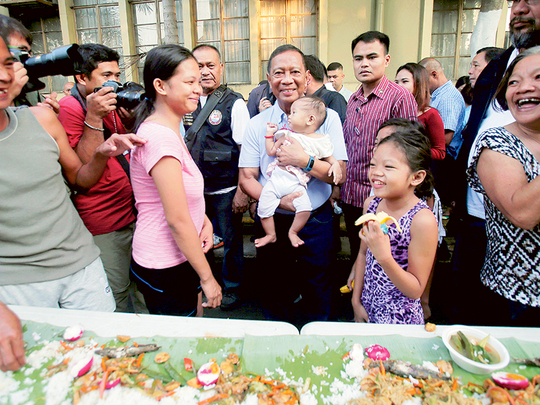
Manila: The Philippines’ election season kicked off on Monday with politicians registering for thousands of posts, launching a typically raucous and deadly seven months of campaigning in a famously chaotic democracy.
A successor to President Benigno Aquino will be chosen in the six-yearly polls, with the front-runners a savvy politician accused of corruption, the adopted daughter of a movie star and a low-key stalwart of the ruling Liberal Party.
Aquino, who has won international plaudits for tackling systemic corruption and for his solid economic stewardship, is imploring voters to choose longtime ally Mar Roxas to continue his “straight path” style of governance.
“This is a campaign to continue the straight path, a campaign to make our hopes possible, a campaign that will continue the heroic story of the Filipino people,” Aquino said at a rally to announce the Liberal Party’s Senate ticket.
President Benigno Aquino III, 6th from left, raises hands with the ruling Liberal Party presidential candidate Mar Roxas, 5th from left, and his running mate Maria Leonor "Leni" Robredo, 6th from right, as they announce the senatorial slate for next year's elections in suburban Quezon city, north of Manila, Philippines Monday, Oct. 12, 2015. In photo, from left, are: former Technical Education and Skills Development Authority (TESDA) Director General Joel Villanueva, former Energy Secretary Jericho Petilla, senator Ralph Recto, Senate President Franklin Drilon, former Food Security Adviser Francis Pangilinan, Aquino, Roxas, Robredo, former Justice Secretary Leila De Lima, Interior Assistant Secretary for Muslim Affairs and Special Concerns Nariman Ambolodto, Senator Teofisto L. Guingona III and Tourism Infrastructure and Enterprise Zone Authority chief operating officer Mark Lapid. (AP)
But Roxas has struggled in opinion polls and is facing strong challenges from Jejomar Binay, the current vice president who is being investigated for graft, and Grace Poe, a political novice riding on her late father’s popularity.
The start of a weeklong registration process began on Monday for more than 18,000 positions up for grabs — from the presidency down to village captain level — in the May elections.
Perennial presidential candidate Elly Pamatong, left, and Congressman Augusto Syjuco pose for the media shortly after filing their certificates of candidacy Monday, Oct. 12, 2015 in Manila, Philippines. Vice-President Jejomar Binay and running mate Gregorio "Gringo" Honasan were the first candidates to file their candidacy before the Commission on Elections Monday. The presidential elections takes place in May 2016. (AP)
Binay, a former Aquino ally who now heads the main opposition party, was the first of the major candidates to register at election headquarters in Manila on Monday morning.
Binay had been a clear leader in opinion polls until the Senate and ombudsman began investigating him for alleged corrupt activities when he was mayor of Makati, the financial district in the Philippine capital.
‘Smear campaign’
Binay has insisted on his innocence, maintaining the allegations are part of a political smear campaign.
The Philippines, a former US colony of 100 million, has struggled to establish a stable democracy, with many of the problems blamed on dictator Ferdinand Marcos’s rule from 1965-1986.
But his son and namesake is running for the vice presidency next year as an independent, insisting his late father’s rule was benign and that voters will focus on present problems rather than the past.
“There are corrupt Filipinos ... within and outside the government who are killing our economy and keeping us poor,” Marcos, 58, said at a weekend rally alongside his controversial mother and former first lady Imelda.
Another feature of the Philippines’ democracy has been politicians resorting to violence to eliminate rivals or cheating to rig polls.
The most infamous incident occurred in 2009, when the warlord family of a southern province allegedly massacred 58 people to try to stop a rival registering his candidacy for provincial governor.
While some members of the Ampatuan family accused of orchestrating the massacre are behind bars and on trial for the murders, many others are expected to compete in the polls.
These include Sajid Ampatuan, who has been charged with murder but was allowed to post bail this year.
Violence
“I am not here to scare the people but to make their vision real,” Ampatuan, who registered on Monday to run for a village mayor position in his family’s stronghold, told AFP by phone.
Pre-election violence had already flared before this week’s registration process.
A roadside bomb injured a local mayor and killed three of his bodyguards in the violence-wracked southern island of Basilan on October 1.
Another enduring challenge for the nation’s democracy has been the power of elite clans who dominate national, provincial and local posts, according to political analysts.
“Philippine politics has always been governed by the elite ... I don’t think the dynasties will change,” Ateneo University political science professor Benito Lim said.
Roxas, for instance, is the grandson of a former president.
And while Binay does not come from a political family, since rising to influence he has set up his own dynasty, with his wife and children becoming powerful politicians.
Only celebrities, such as movie or sporting stars, have generally been able to challenge the elites.
Boxing hero Manny Pacquiao, 36, is one of those.
The eight-time world champion is currently a member of the House of Representatives and will next year run for a higher-profile Senate seat.











